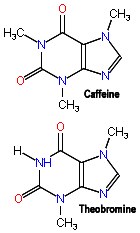TL:DR – Cocoa beans, and so chocolate, can contain a small amount of caffeine despite claims to the contrary.

A front page item on a social bookmarking site claimed that chocolate does not contain caffeine. The link was tied to an introductory paragraph that said: “There is a persistent urban legend that chocolate contains caffeine. It would seem that this rumor is based primarily on a confusion between two similar alkaloids: caffeine and theobromine. Theobromine is the active ingredient in chocolate and it occurs only in [the plant Theobroma cacao. The two stimulants are related and have similar structures.”
Yes, they most certainly do, theobromine (not in any way related to the element bromine by the way) and caffeine are almost the same chemical structure but in the caffeine molecule the hydrogen atom on a nitrogen atom in theobromine has been swapped for a methyl (CH3) group. Why is this important? Well, the difference in chemical and biological activity of two molecules that can differ by a couple of hydrogens and a carbon is astounding. More on that later. What about the site’s claims that chocolate does not contain caffeine?
A quick search on PubMed plucked out several papers all of which have carried out analyses of chocolate to demonstrate that it does indeed contain caffeine. As just one example, in 2006, German researchers Stark, Bareuther, and Hofmann of the German Research Institute for Food Chemistry, in Garching, provided a molecular definition of the taste of roasted cocoa nibs (Theobroma cacao) by means of quantitative studies and sensory experiments. In their paper they state: “theobromine and caffeine…were among the key compounds contributing to the bitter taste of roasted cocoa.” Their tests were carried out using solvent extraction, gel permeation chromatography, and reversed-phase high-performance liquid chromatography (RP-HPLC) and corroborated earlier findings. The actual quantity of caffeine in chocolate is very small, especially compared with the amount of theobromine.
To quote the UK’s Institute of Food Research on the subject of caffeine in chocolate:
“Chocolate contains bio-active compounds, e.g. caffeine and theobromine. Caffeine is only present in small amounts in chocolate – in fact, one would have to eat about eight 100-gram bars of milk chocolate to consume the amount of caffeine present in a cup of coffee. Theobromine is related to caffeine, and is present in chocolate in much higher amounts, although it has relatively weak stimulant effects. It is possible that in combination, these and other potentially bio-active constituents do influence our liking for chocolate. At present, however, there is no direct evidence to support this.”
Caffeine is a bitter-tasting alkaloid, a natural product, a xanthine, found in several plant species, coffee, tea, and cacao. It is a stimulant, like its close chemical cousin, theobromine. There have been dozens of media articles, purportedly based on solid research, that send out mixed messages regarding the health effects of caffeine on people and whether or not we should expose our bodies to this stimulant.
A quick search of the web for cacao theobromine and caffeine reveals several sites warning of the toxicity of stimulants in chocolate, coffee and other products. But, an NIH page also appears that says something along the line of caffeine content need only be reported if levels are above a certain threshold.